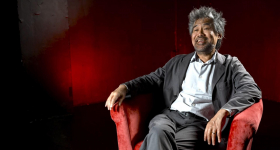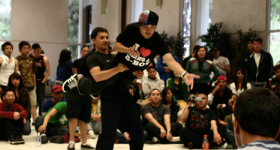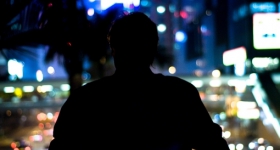Writer Jennifer Huang Photographer Le Dao
When I sat down with Bai Ling, she erupted into words before I had a chance to ask my first question. Problem was, I couldn't figure out what she was saying. I wanted to talk to her about the particular issues facing an Asian actor who has made her body an integral part of her career, including her summer release, The Beautiful Country and her June Playboy magazine spread. But she wanted to share more—in fact, her whole trite-yet-weird philosophy of the universe.
So what made you decide to pose for Playboy?
BL: Actually Playboy magazine came to my manager, you know, they want to write an article and take pictures. I said “Playboy? No, no, no.” Can you imagine? From communist country, China, to the cover of Playboy magazine.
But somehow when I was shooting I felt the most beautiful. I feel it's a gift, it's an honor. Because [Playboy is] the best-selling men's magazine in the world. Best. They have to meet their readers' expectations after 50 years, and they chose me. Normally everything is blonde and fake boobs, but everything I have is natural.
I never told my parents about Playboy magazine. I'm sure right now they heard about it.
Oh, you didn't tell them?
No. Because they already think I'm a little bit half out of my mind. About right now [my mom] probably thinks I'm completely out of my mind.
So what is it like to have an image as a sex symbol? It seems like this is the ultimate sex symbol status.
I think human body is a gift from nature. So that's what Playboy is. I feel like it's a fairyland, a fantasyland for gentlemen. For us to think freely, and to be as a naked animal, which I feel I'm proud to be.
But I think I would feel strange knowing that men I don't know were looking at this, and knowing why they look at Playboy.
But why do you have to think about it? It's like, you contribute your talent, your work, to give love, compassion to others through your intelligence or whatever your work you do. It's the same thing with your body. To give people some solace, some smile, some beauty, some comfort, that's a beautiful thing too.
We were born nude. When we die, we're still nude.
I read that you were part of a performance group in China when you were 14?
I was in the People's Liberation Army. I was a soldier in uniform for three years in Tibet. Served as a soldier, but in an entertainment group. But I learned how to shoot guns. If some wars happen I know how to be a nurse, to give injections to give blood and how you call that, the telegraph.
How do you feel about the roles you get? Many Asian American actors say they are offered only stereotypical roles.
I think stereotypes… I don't mind. I think stereotypes are also a type of character. You know, so much think about stereotypes is a stereotype itself. When you walk into a room you're already stereotyped; you have to be really strong and beautiful ourselves and not negative.
And I think it's reality in Hollywood, in this industry. To make a product for people to consume where the majority of people are white. It's like, when you come to communist China, you don't see in the movies white leading actors. That's not the way of the world.
Where do you consider home?
Wherever I go. In my heart. Hotel rooms, unfortunately! I love hotel rooms. I make a mess, I come back, it's clean.
Do you consider yourself American?
No, I consider myself… sometimes I think I don't exist. Seriously, I feel like I'm a tool for the universe. I feel like I'm fire, wind and air. I feel like I'm an alien, and I come to make movies.









Comments